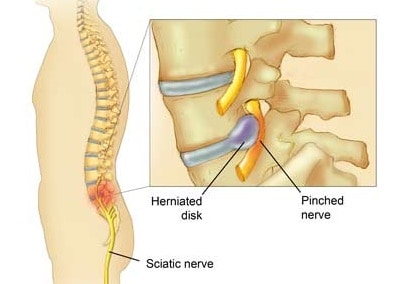Vertebrae are bones that make up your spine and the spinal cord runs through a canal in the center of these bones. Nerve roots branch off of your spinal cord and go between each one of the vertebrae so when there is a problem it affects these nerve roots. This condition is called radiculopathy or pinched nerve. Problems such as this one typically occur in your lower back but can also occur in your neck or other parts of your spine. One interesting place nerves can become pinched by are your tendons and ligaments as they go throughout your arms and legs. This is referred to as mononeuropathy.
How are Pinched Nerves Caused?
Herniated disks are one cause of pinched nerves. Also referred to as a slipped disk, this can occur anywhere in the spine. Your spinal disks have a soft and jellylike center that are encased by a tough but rubber exterior. For a herniated disk or a ruptured disk to occur, the nucleus will push out through a tear in the annulus which is the tough rubber exterior. Symptoms of a herniated disk include pain in the arm or leg, numbness/tingling in the affected body parts area, and weakness. 
Another cause of pinched nerves is age. As you get older it’s common for your disks to shorten and your vertebrae to get closer together. Bone growths also called spurs can press on the nerve roots too. However those over the age of 50 commonly have pinched nerves but no symptoms just yet.
Signs and Symptoms
Signs and symptoms differ between a pinched nerve in the lower back and the neck. Symptoms for the lower back include:
- Numbness of the skin in areas of your leg or foot.
- Weakness in a leg.
- A sharp pain in your back that possibly might travel to your foot. This pain may become worse when sitting or coughing.
Symptoms for your neck include:
- Sharp pain in your arm.
- Pain in your shoulder.
- A numbness feeling or the feeling of pins and needles in your arm.
- Weakness in your arm.
- Pain that worsens when you move or turn your neck.
Diagnosing
A physical exam is the first step. Here your reflexes along with your ability to sense things will be put to the test. Your ability to move your muscles will also be checked. Certain imaging tests may be done as well. These include an x-ray, CT scan, and an MRI. These images show the structures of your neck and back allowing your doctor to see everything.
Treatment
While there are a few small ways to treat a pinched nerve, physical therapy is a great option. Most physical therapy clinics offer cold laser therapy. Laser therapy can lessen inflammation and help with muscle strains. Also exercises will be prescribed at physical therapy. These exercises will help strengthen and stretch muscles in your affected areas. Along with helping relieve any pressure you might have.
Other treatments include medicines such as non-steroidal anti-inflammatory drugs. Some doctors may recommend losing weight to help with any added stress on your body. Lastly, a soft collar might be necessary to wear if your pinched nerve is in your neck.
A pinched nerve isn’t fun but thankfully there are plenty of treatment options incase this happens to you!

